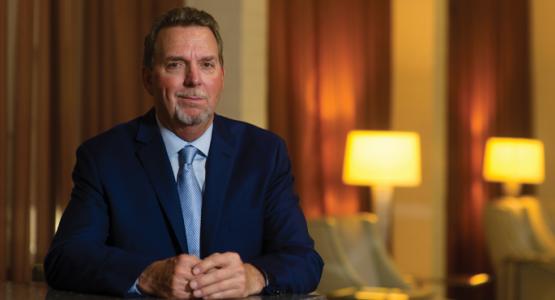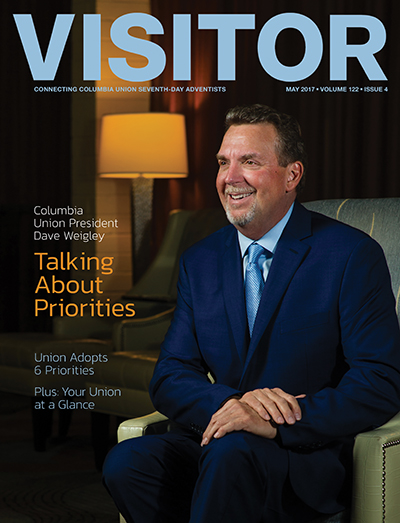
May Feature: Dave Weigley Talking About Priorities
Interview by Celeste Ryan Blyden
Visitor: You’ve been a pastor, evangelist and administrator. What’s been your favorite role?
Dave Weigley: They’ve all been good. I used to say for years that I was a pastor’s pastor. For six years I was a conference ministerial secretary, and I believe it is some of the most rewarding work to be able to come next to caregivers, support them in ministry, pray for them, work with them—very, very rewarding. The current role—leading a union and helping to develop a shared vision, then going forth and trying to execute that—has been very enjoyable too. We touch so many ministries of the church. We work with conferences, schools, a university and two healthcare networks. It’s hard work and very rewarding.
Visitor: What do you think has been your biggest accomplishment?
Weigley: I would say two things. In 1991 I was the first evangelist to go to Russia and preach the gospel in seven different cities along the Volga River. Russia never had the reformation like western Europe. Due to the political climate, there’d never been anyone standing in the pulpits and large arenas preaching the Word of God. Thousands of people came, and it has always been a high point in my ministry.
The other thing would be the emphasis this union has given, for many years, to women in ministry. If God is calling women to ministry, then they should step up and do what God has asked them to do. The work we’ve done in the Columbia Union, and the work I’ve done over the years involving women in ministry, has given me a huge sense of accomplishment.
Visitor: It’s been five years since constituents of this union voted to ordain women called to pastoral ministry. What’s been the result?
Weigley: We’ve seen more women accepting God’s call and becoming involved in ministry in North America, and we’ve seen a steady increase in women entering the Seventh-day Adventist Theological Seminary at Andrews University (Mich.). The North American Division, Pacific Union Conference and other divisions and unions around the world have also voiced their support to recognize women and their call to ministry. The signal has been sent to women that their call is important, and I hope it’s been an encouragement to them.
Visitor: What challenges do you see facing our church today?
Weigley: We talk about this great need to be in unity, and more recently compliance. We are a worldwide church of 20 million members in over 200 countries. How do you unify such a large family? We are unified in Christ, His salvation, grace and many core beliefs. But we are not unified in practice, as evidenced by the audit reports that nearly 80 percent of the world church is out of compliance in some core financial area of policy. We need to recognize how culture informs our beliefs, ideology and practice. And we need to find a way forward where we can continue to focus on mission and effectively minister in the context of our varied cultures.
Here in North America, cultural issues that have historically impacted our nation keep coming to the surface. It’s very unfortunate the way certain classes, races and colors of people have been treated, even in the church and by the church. It’s not right, and the church has to be part of the healing process. The misunderstandings and past hurts are still there, and more conversation needs to take place.
Another big issue is with young adults. We are losing our young adults. They are leaving because, to them, the church is not relevant. We have to be more realistic and understanding. Some of the things we do, some of the norms of the church are simply tradition, handed down from generation to generation. It feels good, but it’s not always biblical. To reach our young adults, we need to get back to what Scripture is saying, back to “primitive godliness.” It’s that basic kernel of truth and understanding of God and living for Him—just pure faith.
 Read and share the following stories:
Read and share the following stories:
- Feature: Dave Weigley Talking About Priorities
- Horses, Harleys and Ministry: 15 Questions for Dave and Becky Weigley
- Editorial: Columbia Union Story
- Meet the Ministry Leaders
- Executive Committee Sets Priorities
- Comité Ejecutivo Vota seis Prioridades
Visitor: Our executive committee recently voted six priorities, including evangelism. How can we successfully evangelize in today’s multifaceted cultural climate?
Weigley: The first priority on our list, spiritual renewal, serves all of them. It begins with that intimate relationship with Jesus Christ—that looking to Christ, to our salvation, to He who is grace and having that connection with Him. Then His Spirit just oozes out of us. It just flows out of us and touches lives. I think the best evangelism is relationship evangelism, where we reach out to a friend, spouse or loved one. We’re able to reach them for Christ when Christ lives in us.
Visitor: You’re a product and proponent of Adventist education. How can we address the concerns of our constituents?
Weigley: It’s a huge challenge because it involves the commitment of parents, the local church and the conference. It takes a huge amount of effort and sacrifice by many people to make that happen. If you look at the budgets of conferences, churches and unions, a big part of the money that comes in goes to Adventist education. It’s not a given any more that members will dutifully enroll in church school. People have to see value for it. At the same time, our schools need to tell the story of how they are delivering a good education with strong academics, as studies have shown.
Visitor: It’s evident our committee members care about social topics that often headline the evening news—race relations, human trafficking, mental health, poverty, immigration, the LGBTQ community, etc. How should the church relate to these conversations?
Weigley: I believe that if we can’t be part of the answer, then we are not God’s church. Christ didn’t come with a heavy political agenda. He came with a humanitarian agenda, where you love your brother and sister. We need to foster that love. One person said it this way: “Seek first to understand before you’re understood.” Too quickly we run up and tell people what we think. Listen. Try to understand, and then try to be part of the solution. If we express Jesus in the right way, we’re going to be part of the healing because He is the solution. Understanding how Christ would relate to these issues and using His methods would be very effective and also very healing in the process.
Visitor: Speaking of healing, how are our hospitals making an impact?
Weigley: Our hospitals mostly provide acute care—handling life and death issues. We also provide health education and a tremendous amount of free care to the community—millions of dollars worth—every year. In our cities and communities, we want to be centers of healing. That is the way Christ ministered; He did more healing than preaching. Wherever He went, He made people better. That’s our focus, too, and we need to continue to help people live better.
Visitor: With all that’s on your plate, how do you stay healthy?
Weigley: I married a wonderful woman 40 years ago. Becky and I stay active; we are committed to exercise. We watch what we eat, try to get adequate sleep, track our steps and follow the eight natural remedies. I also ran a marathon, a half marathon, did some 5Ks races, those types of things. A couple years ago, I had a couple surgical procedures, and they didn’t want me to lay on my back for long. They wanted me to get on my feet, get walking, because the body is made to move. In fact, I have a watch that tells me when it’s time to stand up and move.
Visitor: Our union’s motto is “Experience the Mission.” What does that mean to you?
Weigley: The best way to know Jesus is by working and leading with Him in ministry. And the whole reason He invites us to partner with Him is so we might experience Him. In Mark the fifth chapter, after He cast demons from a man, the man wanted to spend time with Him. But Jesus said, “Go home to your friends, and tell them what great things the Lord has done for you, and how He has had compassion on you” [see Mark 5:19, NKJV]. The man hadn’t even heard a sermon but he went out and started telling his friends, started ministering for Christ. And Mark says that all marveled. So, if you really, really want to know Jesus, accept His mission of reaching lost people, minister to people who have needs, be that hand—that touch of God. It’s the best way to get to know Him.

Add new comment